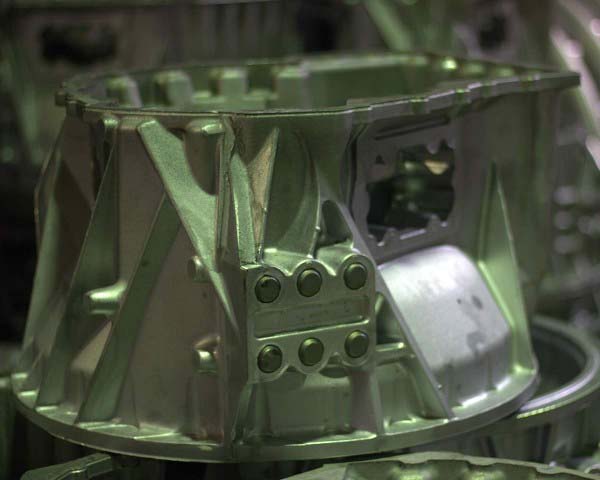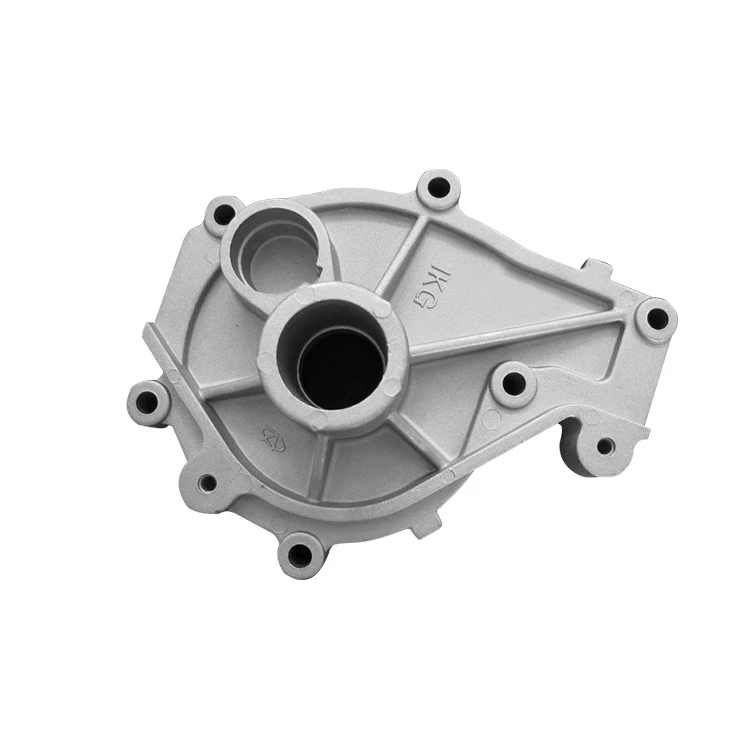Exactly How Light Weight Aluminum Casting Contributes to Reliable Production Solutions
Light weight aluminum spreading plays an important role in modern production. Its light-weight nature and corrosion resistance make it a favored selection for numerous markets. Methods such as die casting and sand casting permit for the development of elaborate components with very little waste. The assimilation of automation further improves manufacturing performance. Nonetheless, the implications of these advancements prolong beyond plain productivity. Understanding the wider impact exposes considerable understandings into the future of manufacturing
The Benefits of Light Weight Aluminum in Manufacturing
Various steels are made use of in production, aluminum stands out due to its distinct properties that improve production effectiveness and item performance. Its lightweight nature significantly decreases transport prices and power needs in different applications. Aluminum's superb deterioration resistance assurances durability and sturdiness, lessening the need for frequent replacements and upkeep. This steel can be quickly formed and formed, permitting for versatile design options that meet certain industry needs. In enhancement, aluminum displays remarkable thermal and electrical conductivity, making it a suitable option for applications calling for efficient warmth dissipation and electric monitoring. The recyclability of aluminum also plays an essential role in lasting production techniques, as it can be recycled without losing its fundamental properties. On the whole, the benefits of aluminum in manufacturing bring about set you back financial savings, boosted product durability, and a minimized environmental impact, making it a preferred product in numerous markets.
Key Light Weight Aluminum Spreading Techniques
Aluminum casting methods are crucial for producing high-grade components in different making processes. The main techniques consist of sand casting, pass away casting, and financial investment spreading. Sand casting includes creating a mold and mildew from sand, which enables for intricate forms and big parts. This technique is often favored for its cost-effectiveness and adaptability. Die casting, on the other hand, makes use of high-pressure to inject liquified light weight aluminum right into steel mold and mildews, causing accurate, consistent parts ideal for high-volume production. Financial investment casting supplies premium surface finish and intricate detail by utilizing a wax pattern that is disappeared to form the mold. Each of these strategies has specific applications and advantages, allowing makers to choose one of the most appropriate technique based upon factors like production product, intricacy, and quantity requirements. By recognizing these crucial strategies, makers can improve their manufacturing effectiveness and guarantee the stability of their light weight aluminum parts.
Influence On Automotive Market
As the vehicle industry increasingly prioritizes lightweight products to improve fuel effectiveness and efficiency, light weight aluminum casting has actually arised as an important remedy. This manufacturing procedure enables car manufacturers to generate complex parts with minimized weight without endangering architectural integrity. By making use of aluminum spreading, producers can create parts such as engine blocks, transmission real estates, and suspension components that are not only lighter yet also show superb thermal conductivity and deterioration resistance.
In addition, the flexibility of light weight aluminum spreading methods makes it possible for the manufacturing of intricate styles, helping with advancement in car appearances and functionality. As lorries become extra technically progressed, the ability to incorporate attributes like sophisticated safety systems and electrical drivetrains comes to be vital.

Aerospace Applications of Light Weight Aluminum Casting
Light weight aluminum casting plays a crucial role in aerospace applications by enabling the production of lightweight structural parts that enhance fuel effectiveness. Furthermore, the precision of aluminum casting allows for the development of detailed engine components, which are crucial for peak efficiency and dependability. This combination of lightweight products and exact design settings aluminum spreading as a crucial modern technology in the aerospace sector.
Light-weight Structural Parts
In the quest for enhanced efficiency and efficiency in aerospace applications, lightweight structural components have actually come to be progressively vital. Aluminum casting plays a critical function in this endeavor, giving makers with the capacity to create components that are both solid and lightweight. The reduced thickness of light weight aluminum permits significant weight decreases without endangering architectural stability, which is critical for airplane efficiency and fuel effectiveness. Furthermore, light weight aluminum castings can be engineered to satisfy certain layout demands, allowing the development of intricate geometries that typical production techniques might have a hard time to achieve. This versatility not just improves manufacturing procedures but also adds to total expense savings. As the aerospace industry remains to emphasize sustainability, the need for light-weight aluminum parts is anticipated to increase, better advancing technology in production.
Accuracy Engine Parts
Manufacturers increasingly depend on aluminum spreading to produce accuracy engine components for aerospace applications, driven by the product's special buildings. Light weight aluminum's light-weight nature considerably minimizes overall airplane weight, enhancing fuel effectiveness and efficiency. Its outstanding corrosion resistance warranties longevity in rough environments, making it optimal for critical engine elements. In addition, light weight aluminum casting permits complex layouts and tight resistances, necessary for enhancing engine performance and dependability. The spreading procedure likewise sustains automation, enabling producers to satisfy high need while keeping top quality criteria. As aerospace modern technology remains to advance, the function of light weight aluminum casting in developing precision engine components will be critical in attaining higher efficiency and innovation in aircraft style and performance.
Sustainability and Ecological Advantages
The expanding focus on sustainability in production has actually positioned aluminum spreading as a leading remedy for environmentally mindful production. This procedure makes use of recycled aluminum, which substantially minimizes energy usage compared to primary aluminum manufacturing. By leveraging scrap metal, manufacturers can lower their carbon impact and minimize waste, straightening with global sustainability goals.
In addition, aluminum spreading creates fewer damaging discharges, contributing to a cleaner atmosphere. The light-weight nature of aluminum additionally boosts fuel effectiveness in transportation applications, further advertising environmentally friendly practices.
Additionally, the longevity and rust resistance of light weight aluminum result in longer item lifespans, decreasing the requirement for regular replacements and saving sources. As markets progressively prioritize lasting choices, aluminum spreading sticks out as an innovative technique that not only satisfies production needs but likewise supports ecological stewardship. This commitment to sustainability placements aluminum spreading as an essential player in the change in the direction of a greener manufacturing landscape.
Price Efficiency in Manufacturing
Expense performance is a considerable advantage of light weight aluminum spreading, complementing its sustainability advantages - Aluminum Casting Company. The process of aluminum spreading enables the manufacturing of complex shapes with marginal waste, which is particularly vital in a competitive production environment. Using light weight aluminum reduces energy prices, as it has a lower melting factor contrasted to various other steels, causing decreased power intake throughout manufacturing
Additionally, aluminum's lightweight residential or commercial properties add to reduce delivery and managing costs, better enhancing general expense performance. The toughness and deterioration resistance of aluminum cast products also mean that they require less maintenance and replacement over time, causing long-term savings for makers.
Additionally, advancements in casting innovations, such as improved mold and mildew designs and automation, have structured production website procedures, lowering labor expenses and raising outcome effectiveness. In general, expense efficiency in aluminum spreading plays a vital duty in enhancing production operations and supporting affordable prices strategies.
Future Fads in Light Weight Aluminum Casting
The future of light weight aluminum casting is progressively shaped by advancements in automation and lasting material innovations. Automation modern technologies are expected to boost effectiveness and accuracy in the spreading process, while sustainable practices intend to minimize ecological effect. Together, these patterns assure to redefine manufacturing criteria and practices within the light weight aluminum casting market.
Automation in Light Weight Aluminum Spreading
Accepting automation is transforming aluminum casting processes, paving the means for improved efficiency and accuracy. Automated systems streamline production by minimizing human treatment, lowering errors, and increasing throughput. Technologies such as robotic arms and computer mathematical control (CNC) makers enable constant and exact shaping of light weight aluminum parts. Additionally, smart sensing units monitor different criteria in genuine time, guaranteeing optimal problems throughout the casting process. This combination of automation not just reduces lead times yet additionally enhances product quality by keeping tighter tolerances. As makers significantly take on these innovative modern technologies, the light weight aluminum spreading market is set to experience significant renovations in functional efficiency, cost-effectiveness, and competitiveness in the international market.
Lasting Material Innovations

Frequently Asked Questions
What Kinds Of Aluminum Alloys Are Typically Utilized in Casting?
Generally utilized light weight aluminum alloys in casting include 356, 380, and 413. These alloys are preferred for their excellent fluidity, toughness, and rust resistance, making them suitable for a range of industrial applications.
Exactly How Does Light Weight Aluminum Spreading Compare to Various Other Steel Casting Methods?
Aluminum casting normally supplies reduced weight, exceptional deterioration resistance, and better thermal conductivity compared to other metal spreading techniques. In addition, it permits intricate designs and faster manufacturing cycles, improving general production effectiveness and performance.
What Industries Benefit A Lot Of From Light Weight Aluminum Spreading?
The automotive, aerospace, and electronics markets benefit most from light weight aluminum spreading. These fields use its light-weight, corrosion-resistant residential properties to boost efficiency, reduce gas usage, and improve overall item effectiveness, making aluminum casting increasingly vital.
Exist Details Style Limitations With Light Weight Aluminum Casting?
Yes, aluminum spreading has design limitations, including restrictions on wall surface thickness, complicated geometry difficulties, and prospective problems with accomplishing limited tolerances (Aluminum Foundry). These aspects can impact the general stamina and functionality of the end product
Exactly How Is High Quality Control Maintained in Aluminum Spreading Processes?
Quality assurance in aluminum casting processes is kept via rigorous examinations, adherence to standard treatments, and the usage of sophisticated modern technologies. Normal surveillance guarantees dimensional precision, surface area integrity, and product consistency throughout production, advertising general integrity.
As the auto sector significantly prioritizes light-weight products to improve gas efficiency and performance, light weight aluminum casting has actually arised as a vital service. Aluminum casting plays a critical role in aerospace applications by making it possible for the manufacturing of lightweight structural components that improve gas efficiency. Cost performance is a significant advantage of light weight aluminum casting, complementing its sustainability benefits. Welcoming automation is changing light weight aluminum casting procedures, leading the way for improved performance and precision. Recycled aluminum use has actually acquired grip, substantially decreasing power intake compared to main aluminum manufacturing.